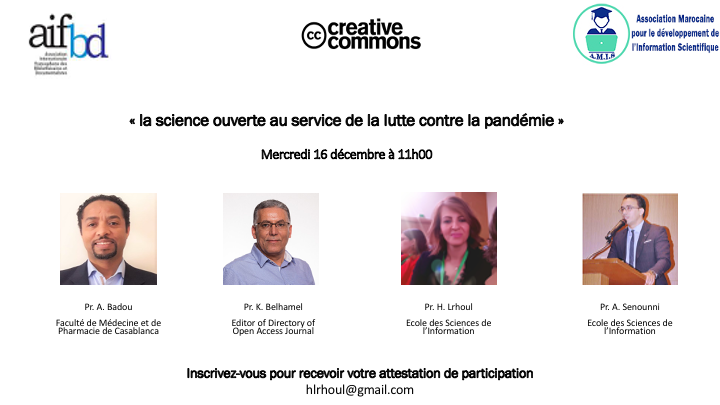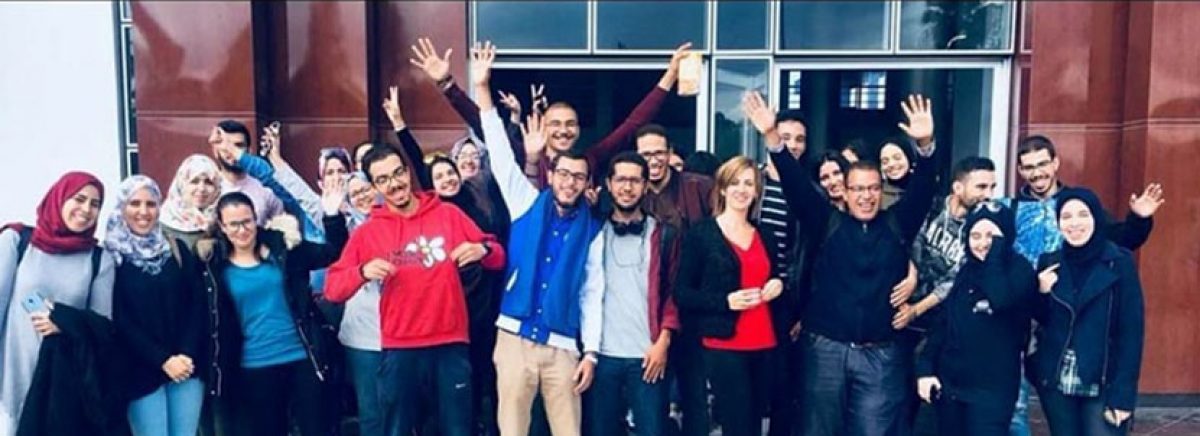« Open science and the Covid-19 challenges »

Moroccan researchers face many constraints to access to scientific information: The increase in subscription fees and serial crisis, lack of infrastructures, Internet connection and competencies in university libraries. In addition, there is a lack of awareness of the benefits of open access to scientific information in terms of increasing their impact and their visibility.
Open access to scientific information and educational resources is becoming more and more necessary in this period of Covid-19 pandemic, where the demand for scientific articles and references is increasing considerably.
To develop the vaccine, a race has been launched all around the world to access to research data, patents and scientific information. universities have moved to e-learning and students took benefit from the resources offered by commercial publishers. How can this equitable access to information be perpetuated in our countries? how to ensure the commitment of our decision-makers to optimize the access to information?
The establishment of the Moroccan Chapter is an outcome of many previous years of interest of their members in developing open access to scientific information and creating open repositories. An open access strategy will be suggested to the Moroccan Ministry of Higher Education and Scientific Research to launch a training program about the use of CC licenses in Moroccan universities.
We are delighted to invite you to attend the First Virtual Moroccan Chapter meeting on December 16th, 2020 to exchange around open access to scientific information and to understand the opportunities offered by CC licenses to both share and protect your creations.
“Webinar on Open Science and the Decolonization of Knowledge”
“La Commission canadienne pour l’UNESCO et la Chaire UNESCO en recherche communautaire et responsabilité sociale dans l’enseignement supérieur collaborent pour soutenir une série de webinaires internationaux en appui aux consultations de l’UNESCO sur la création d’une Recommandation sur la science ouverte, un document normatif international qui sera adopté par la Conférence générale de l’UNESCO en novembre 2021. La série de webinaires est basée sur un dossier préparé par Florence Piron (Université Laval), Leslie Chan (Université de Toronto), Lorna Williams (Université de Victoria, Première nation Lil’wat), Rajesh Tandon (PRIA India) et Budd Hall (Université de Victoria)”.
“Open Access publishing and its Implications for Knowledge Equity in the North African countries”
The use of newer information and communication technologies (ICTs), particularly the Internet, has accelerated the production, circulation of scholarly literature in every form. Free-to-access publications are not disseminated as widely as possible, leading to restricted readership and thus diminishing their overall impact. The key challenge to equitable access to scientific research publications is the high subscription cost which is unaffordable for most researchers in Africa and Arab world.
Open access scholarly literature is more equitable than subscription-based publishing by allowing everyone with an internet connection, unrestricted access to scientific and scholarly information all over the globe. Despite a number of challenges, the open access (OA) journals and institutional repositories show some successes and increased awareness on open access in North Africa and Arab world. Communicating scholarly information through open access repositories provide the added advantages of faster publishing opportunities, greater visibility for authors and institutions.
